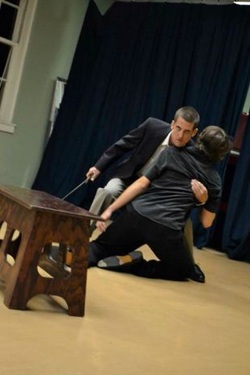 Posted by apangburn in Improbable Fictions, University of Alabama This performance of Hecuba marked a series of firsts for the Improbable Fictions staged reading troupe. It was their first of a planned three staged readings for this fall, their first foray outside of Shakespeare, and the first in their new home, The Bama Theatre’s Greensboro Room. It is a peculiar venue for drama. Folding chairs cluster on two sides of the stage area, which backs up to windows facing the street, windows which occasionally frame curious or bemused pedestrians. The room contains no raised stage; while it is always easy to hear the actors, it is sometimes difficult to see them. Actors who kneel or are below average height occasionally find themselves briefly obscured from view. While this is, at times, distracting, perhaps it is appropriate; Greek drama, with its masks and large theatre venues, was designed first and foremost to be heard. While they may need some time to work out the kinks at their new home, the Improbable Fictions ensemble has unquestionably become stronger each semester since their foundation in the spring of 2010. This is drama stripped down to its most essential elements. They employ almost no props, limited lights, and simple costuming. In a subtle visual representation of the power dynamic within the world of the play, the Greek men, recent victors in the Trojan War, wear suits, while the enslaved Trojan women are clothed in simple dresses and head coverings. The performance features strong acting turns from everyone, all the way from Deborah Parker in the title role to an intimidating turn by Eric Marable, Jr. as a silent Greek solider. The story continues..... IN CULTURE, NEWSLETTER, THEATRE / BY GABRIEL DICKSON / ON SEPTEMBER 21, 2011 AT 1:18 AM /
Euripides’ “Hecuba” is coming to Tuscaloosa for one night only on Thursday, Sept. 22 in the Greensboro Room at the Bama Theatre. The play deals with Queen Hecuba of Troy as a captive of the Greeks after the Trojan War. She is grief-stricken after her sons and husband were killed in the fighting and she had to sacrifice her own daughter, Polyxena, to appease the ghost of Achilles. “Hecuba” will be performed by Improbable Fictions, a staged Shakespearean reading series at the University started by Nic Helms and Alaina Jobe Pangburn while they were attending graduate school at Alabama in 2008. This season, the works of Shakespeare as well as other works of the ancient Greeks will be featured. According to Helms, the mention of Shakespeare and theater automatically brings notions of high culture, something only intended for the rich and something performed by professional theatre troupes. Helms and Pangburn founded the group to debunk that myth and to help students understand the work. “Shakespeare’s plays have endured for four centuries because people reproduce them and add something that incorporates and resonates with locals,” Helms said. They make use of minimalist effects, bare stage and contemporary costumes to add to the full experience of a play sans distractions, not “huge wigs and poofy dresses.” Steve Burch, associate professor of theatre and dance and also the man responsible for directing “Hecuba,” said he believes the theatre experience is important for any community. “It’s an intimate, emotional, intellectual, and physical connection in front of an audience.” Burch said. “It’s connecting to essences in human life.” Burch also heads The Rude Mechanicals, a local Shakespeare group that specializes in outdoor readings. Sometimes, however, those essences can drag on and be non-integral to the story. Cuts are often made in relevance to the local audience. Taken from Crimson White - CW.ua.edu |
Accessibility | Equal Opportunity | UA Disclaimer | Site Disclaimer | Privacy
Copyright © 2020 | The University of Alabama | Tuscaloosa, AL 35487 | (205) 348-6010
Website provided by the Center for Instructional Technology, Office of Information Technology
Copyright © 2020 | The University of Alabama | Tuscaloosa, AL 35487 | (205) 348-6010
Website provided by the Center for Instructional Technology, Office of Information Technology

 RSS Feed
RSS Feed